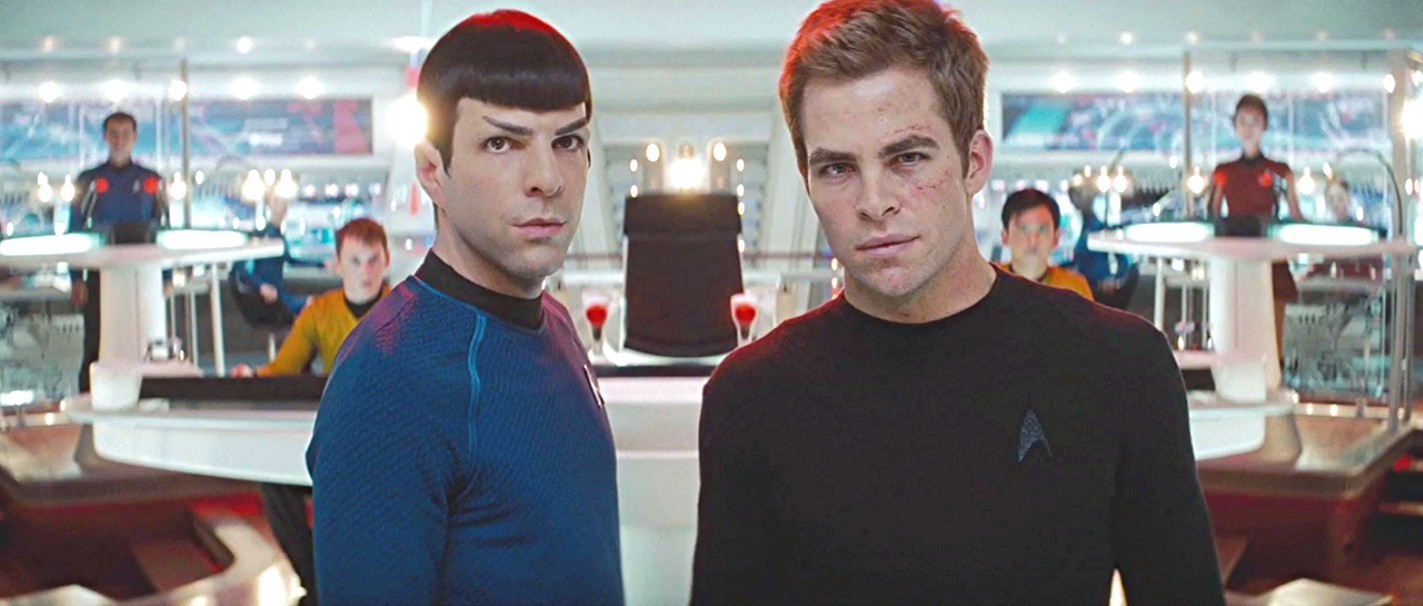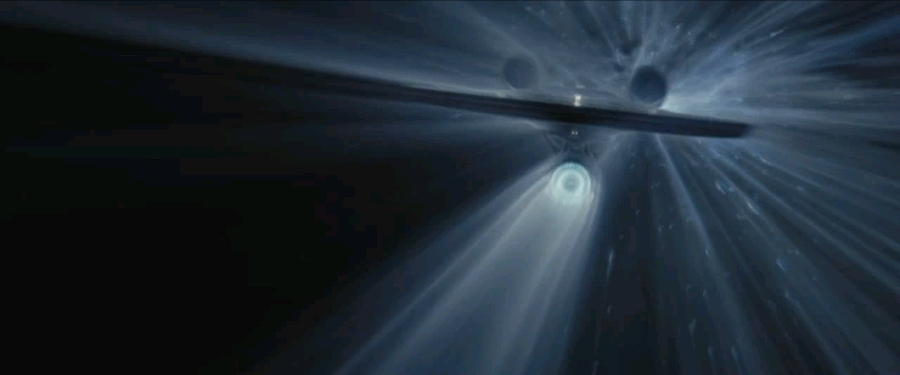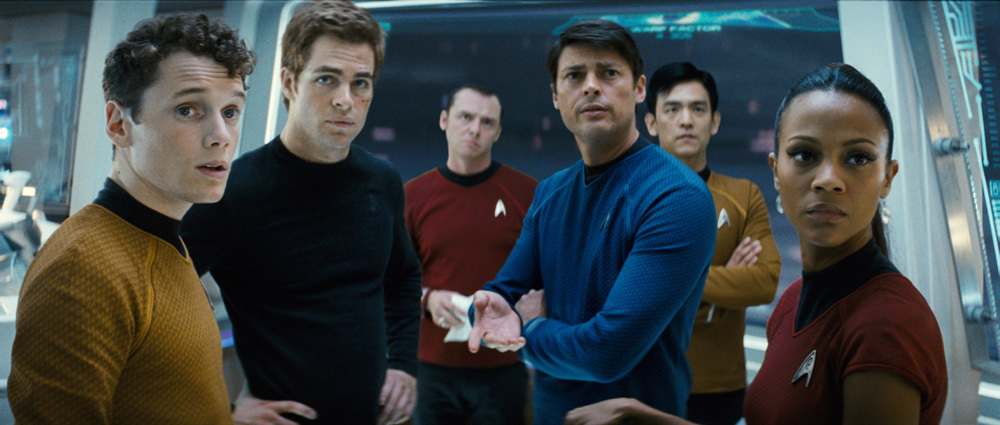Star Trek (2009)
DIRECTOR: J.J. Abrams
CAST:
Chris Pine, Zachary Quinto, Karl Urban, Zoe Saldana, Eric Bana, Bruce Greenwood, Simon Pegg, Anton Yelchin, John Cho, Ben Cross, Winona Ryder, Chris Hemsworth, Jennifer Morrison, Faran Tahir, Leonard Nimoy
REVIEW:
For the first feature film Star Trek entry since 2002’s much-maligned box office flop Star Trek: Nemesis (giving an ignominious send-off to the Next Gen crew led by Patrick Stewart’s Captain Picard), J.J. Abrams (director of Cloverfield and creator of the Lost television series) and writers Roberto Orci and Alex Kurtzman (writers of 2007’s Transformers) have attempted to do much the same for Star Trek what Christopher Nolan did for Batman; mix things up and inject freshness in a way that the new film is not tied down to those that came before. While the simply-titled Star Trek is not quite as triumphant a success as The Dark Knight , in my opinion, Abrams and cast and crew have mostly succeeded at what they set out to do. Trekkies with open minds may find much to appreciate here, but be forewarned: this ain’t your Daddy’s Star Trek.
 Part of the goal here, as with any reboot bid at saving a floundering film franchise, is to draw in a wider audience, reaching beyond the built-in Trekkie base for the mainstream crowds, and Abrams very deliberately starts things off with a blast, with a rousing and poignant prologue showing the devastating attack on Federation ships by a massive warship commanded by a rogue Romulan called Nero (a barely recognizable Eric Bana). Not for the first time in Star Trek, the villain comes from the future to change the past, but after his opening volley, Nero is quiet for twenty-five years, during which time we are introduced to two sharply-contrasting men whose paths are destined to cross. James Tiberius Kirk (Chris Pine) is a hot-rodding, skirt-chasing, bar fighting rebel without a cause who is persuaded to join Starfleet after a chance meeting with Captain Christopher Pike (Bruce Greenwood) of the new starship USS Enterprise, who sees that the young man has potential and just needs a direction. Meanwhile, the half-human, half-Vulcan Spock (Zachary Quinto) is trying to find his path between human ways and Vulcan values urging clear, cold logic and tight control over emotions. Three years and a chance confrontation later, Kirk and Spock both end up on the bridge of the Enterprise, joining a crew also including Uhura (Zoe Saldana), who gets hit on by Kirk but has more affection for Spock, Sulu (John Cho), who is trained in fencing, seventeen-year-old Russian whiz kid Chekov (Anton Yelchin), whose accent is so thick even the voice-activated computer has trouble understanding him, and Kirk’s first Starfleet friend, grumpy medical officer ‘Bones’ McCoy (Karl Urban), who already acts like his own crotchety grandpa. They are joined in time by engineer Scotty (Simon Pegg) and a visitor from the future, the elderly Spock (Leonard Nimoy), who brings information about Nero’s planet-destroying plans.
Part of the goal here, as with any reboot bid at saving a floundering film franchise, is to draw in a wider audience, reaching beyond the built-in Trekkie base for the mainstream crowds, and Abrams very deliberately starts things off with a blast, with a rousing and poignant prologue showing the devastating attack on Federation ships by a massive warship commanded by a rogue Romulan called Nero (a barely recognizable Eric Bana). Not for the first time in Star Trek, the villain comes from the future to change the past, but after his opening volley, Nero is quiet for twenty-five years, during which time we are introduced to two sharply-contrasting men whose paths are destined to cross. James Tiberius Kirk (Chris Pine) is a hot-rodding, skirt-chasing, bar fighting rebel without a cause who is persuaded to join Starfleet after a chance meeting with Captain Christopher Pike (Bruce Greenwood) of the new starship USS Enterprise, who sees that the young man has potential and just needs a direction. Meanwhile, the half-human, half-Vulcan Spock (Zachary Quinto) is trying to find his path between human ways and Vulcan values urging clear, cold logic and tight control over emotions. Three years and a chance confrontation later, Kirk and Spock both end up on the bridge of the Enterprise, joining a crew also including Uhura (Zoe Saldana), who gets hit on by Kirk but has more affection for Spock, Sulu (John Cho), who is trained in fencing, seventeen-year-old Russian whiz kid Chekov (Anton Yelchin), whose accent is so thick even the voice-activated computer has trouble understanding him, and Kirk’s first Starfleet friend, grumpy medical officer ‘Bones’ McCoy (Karl Urban), who already acts like his own crotchety grandpa. They are joined in time by engineer Scotty (Simon Pegg) and a visitor from the future, the elderly Spock (Leonard Nimoy), who brings information about Nero’s planet-destroying plans.
 As part of its bid to attract wider audiences, Star Trek opens with a bang, and consistently puts much emphasis on action, comedy, and special effects, with by far the fastest and most action-oriented pace of any Star Trek movie. The familiar time travel plot device is also used in such a way that nothing is set in stone by the previous movies. Nero’s entrance in the past during Kirk and Spock’s childhoods changes both of their personal histories, and history in general. The timeline established by decades of Star Trek films and television series, if not completely wiped out, at least exists in an alternate dimension to this one, where, conceivably, anything goes. This conveniently frees Abrams’ hands and allows him to take his story in different directions, taking license with established Trek history and even with the specifics of Kirk and Spock’s characters, since things happen during their childhoods here that weren’t “supposed” to happen. The explanation that an alternate timeline separate from the original has been created also cleverly gives Abrams a way to dodge alienating the longtime fan base who might be outraged if Abrams pulled a Casino Royale and just voided everything that happened previously.
As part of its bid to attract wider audiences, Star Trek opens with a bang, and consistently puts much emphasis on action, comedy, and special effects, with by far the fastest and most action-oriented pace of any Star Trek movie. The familiar time travel plot device is also used in such a way that nothing is set in stone by the previous movies. Nero’s entrance in the past during Kirk and Spock’s childhoods changes both of their personal histories, and history in general. The timeline established by decades of Star Trek films and television series, if not completely wiped out, at least exists in an alternate dimension to this one, where, conceivably, anything goes. This conveniently frees Abrams’ hands and allows him to take his story in different directions, taking license with established Trek history and even with the specifics of Kirk and Spock’s characters, since things happen during their childhoods here that weren’t “supposed” to happen. The explanation that an alternate timeline separate from the original has been created also cleverly gives Abrams a way to dodge alienating the longtime fan base who might be outraged if Abrams pulled a Casino Royale and just voided everything that happened previously.
Of course, one of the things many viewers will be doing is mentally judging which young cast members do the best jobs stepping into the shoes of their older alter egos. Chris Pine does a solid job of capturing Kirk’s brazen cockiness while tempering it with enough heroism and earnestness to keep his Kirk from coming across as too much of a jerk, without doing an outright impression of William Shatner (Pine doesn’t attempt to speak like Shatner; no “dramatic pauses”), although there are moments when he is subtly reminiscent. Zachary Quinto strikingly resembles a young Leonard Nimoy (the resemblance is not dispelled even when they stand face-to-face), but brings out more of Spock’s conflict between his Vulcan and human sides. There is still the cool, analytical, logical aspect, but Quinto’s Spock shows a bit more emotion. Perhaps the biggest surprise in the supporting cast is Karl Urban, who does a delightfully on-target imitation of DeForest Kelley— probably the most overt imitation of anyone— doing plenty of skulking around muttering ‘damn it Jim!’ and constantly reminding everyone ‘I’m a doctor!’. Zoe Saldana gives Uhura a sexy boost and a touch of feistiness (Kirk tries putting the moves on her, but she’s not impressed), along with providing one half of an unexpected onboard romance. John Cho and Anton Yelchin stay mostly in the background and don’t get a lot to do besides Cho getting one action scene where he gets to show off Sulu’s swordfighting and hand-to-hand combat skills, and Yelchin getting a laugh or two out of Chekov’s impenetrable accent (incidentally, this is the second entry in an ongoing sci-fi franchise this summer to feature Yelchin as the younger version of an established character, following his young Kyle Reese in Terminator: Salvation). Simon Pegg is a little “off” as Scotty, who’s mostly relegated to comic relief. As Star Trek villains go, Eric Bana’s Nero is mediocre and generic, and despite a semi-tragic backstory, a planet-destroying superweapon, and some hammy ranting and raving, he never makes much of an impression and feels like little more than a thin plot device to bring our familiar crew together. Bruce Greenwood is fine as Captain Pike (a somewhat more noble figure than the shifty characters he’s sometimes typecast as), Ben Cross has a couple nice moments as Spock’s father Sarek (though this version is a little more warm and fuzzy, comparatively speaking, than his original counterpart), and Winona Ryder has little more than a cameo as Spock’s human mother (her makeup doesn’t quite make up for the lack of a sufficient age gap between she and her onscreen “son” Quinto). Leonard Nimoy’s extended cameo is dearly welcome as not only a needed bridge between the old and the new, but allowing him to effortlessly slip back into a role he last played eighteen years ago without missing a beat (to see Nimoy utter lines like “I have been and always shall be your friend” and “live long and prosper” one last time is the stuff that brings tears to Trekkie eyes).
 Obviously the special effects are far more advanced, sophisticated, and detailed than anything seen in the Star Trek universe thus far. The ships and space battles are on par with those in the Star Wars prequels. In addition to the ships, we also have Kirk being chased by a huge snow monster that then gets taken out by a much larger monster (which bears a suspicious resemblance to the monster in Abrams’ Cloverfield), and Nero turning a planet into a black hole (making it rather the understatement when Nimoy’s ‘Spock Prime’ describes him, as dryly as only Spock can, as “an especially troubled Romulan”).
Obviously the special effects are far more advanced, sophisticated, and detailed than anything seen in the Star Trek universe thus far. The ships and space battles are on par with those in the Star Wars prequels. In addition to the ships, we also have Kirk being chased by a huge snow monster that then gets taken out by a much larger monster (which bears a suspicious resemblance to the monster in Abrams’ Cloverfield), and Nero turning a planet into a black hole (making it rather the understatement when Nimoy’s ‘Spock Prime’ describes him, as dryly as only Spock can, as “an especially troubled Romulan”).
There is more that does work, but also some that doesn’t work. The scenes of comic relief, while often effectively funny, are too numerous and, especially early on, almost make the movie seem like a comedy. Also a little hard to take is the romance between Spock and Uhura; it’s not so much Uhura’s affection for Spock, but Spock returning it, that doesn’t quite seem Spock. Scotty is around almost entirely for comic relief, and crew members like Chekov and Sulu aren’t given much to do, besides all three serving a plot purpose or two at an opportune moment. There’s no underlying theme or message, unlike many Star Trek movies, and that might be an unfortunate side effect of the more action-oriented approach; the movie whisks along at a fast pace but loses a little depth and character development along the way. There’s an occasional nice character moment, mostly involving Spock, and a couple heated bridge confrontations between Spock and Kirk, but this rebooted crew is slapped together through coincidence and emergency. By the climax, there’s some fledgling camaraderie especially between Kirk/Spock, but no time for the kind of bonding formed over years of serving together. The movie throws in all kinds of nods to the ‘old’ Trek. Bones gets plenty of ‘damn it Jim’ and ‘I’m a doctor, not a psychiatrist/miracle worker/engineer/etc.’ lines. Nimoy and Quinto exchange Vulcan salutes, and Nimoy reprises a couple of his most iconic lines. There’s throwaway name drops of characters like Admiral Archer and Nurse Chapel, that will mean more to Trekkies than casual viewers. During the climactic battle, Simon Pegg gets to yell Scotty’s signature line.
Admittedly it’s a little odd initially to have other, young actors appearing onscreen and being introduced as Jim Kirk, Spock, Bones McCoy, Pavel Chekov, etc., but especially in the second half of the film, things are falling into place to where we hear echoes of the past in our young crew, with Nimoy’s climactic rendition of the ‘these are the voyages’ narration capping it off with a suitably nostalgic final note. Everything old is new again. J.J. Abrams and his cast and crew have indeed boldly gone where no one has gone before, giving things an updated sensibility without losing the fundamental Trek feel, and the cast do respectable jobs of echoing their predecessors in their chairs without resorting to simple mimicry. The movie isn’t perfect, but it’s an obviously affectionate homage to the adventures of the original crew, and for everyone else, a slick slice of big high energy summer entertainment that proves itself worthy of the name Star Trek.
* * *